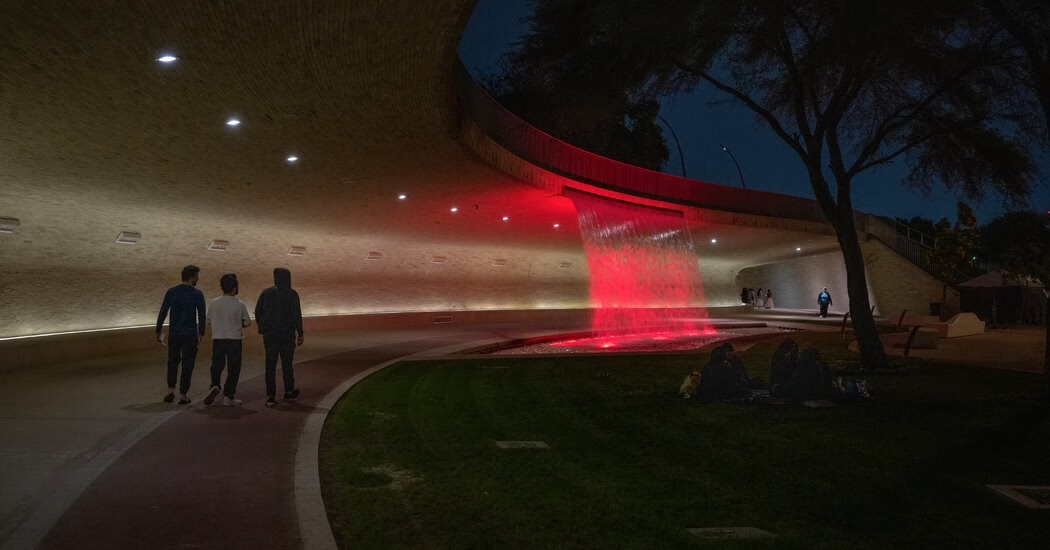Nilab, when struggling to focus, writes her concerns down on slips of paper, which she pins to her wall. This technique, learned at an American University of Afghanistan seminar, helps her deal with her worries and refocus on her studies.
Keeping mentally balanced, this approach sustained her through the turbulence following the 2021 overthrow of the U.S.-backed Afghan government by the Taliban, who then banned female education. In July 2023, she left to continue her studies at the university’s campus-in-exile in Qatar.
Now, in her dorm in Doha, her notes keep multiplying. The cessation of foreign aid and refugee admissions by the Trump administration has left her in fear of being forced back to Afghanistan.
In Afghanistan, she would be alone, stripped of her rights as a woman, making her American-style education nearly worthless.
She envisions a dire future. “How can girls return to Afghanistan?” Nilab, who asked for anonymity, fears for her future and those of her peers, dreading “rape, forced marriage and death”.
Just as she was planning her final project for her cybersecurity degree, President Trump’s executive order suspending refugee resettlement shattered her and her classmates’ hopes of gaining asylum and reuniting with their families in the US, who had already received asylum after the Taliban’s takeover.
A month later, her university faced severe funding cuts when Mr. Trump dismantled American foreign aid programs. While some funding was restored, it was only enough to sustain operations into June. If the university closes, students would lose everything.
Further uncertainty came from Mr. Trump’s consideration of adding Afghanistan to a list of countries whose citizens would be barred from entering the US, leaving Nilab in a limbo regarding seeing her family and resettling with them.
As Nilab and her peers face life upheavals, their dreams of a university education clash with the harsh reality that their futures may be scarce.
She had thought her journey was complete. She was wrong.
With exams nearing, Nilab can’t spare the time to dwell on her fears. She writes them down and pins them to her bulletin board.
Piece of America
Founded in 2006, the American University of Afghanistan was a liberal arts college with English instruction designed to cultivate the country’s future leaders. The US government invested over $100 million, with USAID funds covering more than half of its operating costs until last month.
USAID also offers scholarships for Afghan women, including Nilab’s sister, to study in Oman and Qatar, and these students confront a similar budget freeze.
After the US military withdrawal in August 2021 and the Taliban’s return, the American University became a target, with students accused of being “US-trained infidel spies”. Administrators evacuated students, with Qatar agreeing to host a temporary campus-in-exile.
One hundred students arrived for the 2022 term, and Nilab’s group a year later. Most students have left for the US on Priority 1 visas, but the remaining ones are still awaiting their final interviews.
Students are in shock, left in the near-empty halls of their temporary campus, uncertain about their futures.
They had hoped to start anew, but now that future seems lost.
Aspirations have been thwarted across the campus, as students turn their dreams into bullet points on their bulletin boards.
Faisel Popalzai, a student on the verge of securing a job at Microsoft, questions the Trump administration’s decision to shut its doors, highlighting their investment in the students’ minds.
Students are aware of the contradiction between their Western-style education and the Taliban’s ideology, fearing they may be viewed as threats upon return to Afghanistan.
Goals have shifted from career aspirations to simply leaving the country and surviving.
They question their potential sacrifice of rights for the promise of a visa, emphasizing the importance of their education and contributions.
In the midst of uncertainty, Nilab seeks solace in her faith and keeps her options open by applying for scholarships in Europe as she navigates her studies and the visa process.
She holds onto hope, believing that another door will open, as long as she keeps knocking.
Source: https://www.nytimes.com/2025/03/30/world/asia/afghanistan-students-qatar-funding.html





